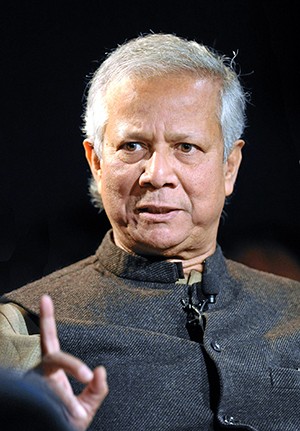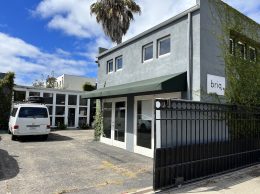Microlending founder urges business leaders to reinvest profits
IN THIS ARTICLE
- Banking & Finance Topic
- Henry Dubroff Author
By Henry Dubroff Friday, February 28th, 2014

Muhammad Yunus at the World Economic Forum in 2012 (Wikipedia Commons photo licensed under Creative Commons: http://bit.ly/1jGyfFU)
Nobel Laureate and founder of Grameen Bank Muhammad Yunus never intended to create a microlending juggernaut or invent the idea of a social business.
Instead, he told a crowd of about 800 at the annual Westmont President’s Breakfast he was trying to fill a local need. “My work was not pre-planned,” he said. “It was an action born out of desperation,” the Vanderbilt University-trained economist told the audience.
Day after day as the Bangladesh’s post-independence financial crisis unfolded in the 1970s, Yunus saw loan sharks turning borrowers into virtual slaves in the neighborhoods next to the University of Chittagong where he was economics department chair.
“I decided to jump in and and take action,” he said. Yunus said he succeeded by turning most conventional banking principles upside down. “All I have done is battle with the bankers.”
Instead of demanding collateral, he made loans based on the potential future income of his very borrowers. Instead of banking wealthy men, he banked poor females. And he shunned cities and went to remote towns — indeed, the word “Grameen” means village. Also, because there was little paperwork, Grameen was pretty much free of lawyers, he said, as a few in the audience groaned.
Today, Grameen is a worldwide lender which is in the process of opening two offices in the Los Angeles area. Yunus thinks he can create much more opportunity than the current scourge of America’s banking system, the payday lenders. “Payday lending is repulsive,” he said. “Banking must be an inclusive institution.”
The idea of a social business, he said, was born out of his belief that businesses must do more than make money — they can solve societal problems in creative and cost effective ways. “Making money is an incentive, but the challenge is that capitalism has been misinterpreted,” he said.
These days, Yunus-sponsored ventures include a series of hospitals in Bangladesh that specialize in eye surgery, solar ventures and a yogurt plant being build in partnership with French food giant Danone. Yunus has been intrigued by the challenge of reinventing the post-earthquake Haiti economy as one that is more self-sufficient in producing food and in restoring its once plentiful forests.
Like many conventional entrepreneurs, notably Amazon CEO Jeff Bezos, he believes the key to success is to keep plowing profits back into your enterprise. What Yunus calls the “continuous reinvestment of capital” is necessary if a social business is really going to change societal values.
[Editor’s Note: Due to an editing error, this story originally misidentified the location of the University of Chittagong.]









